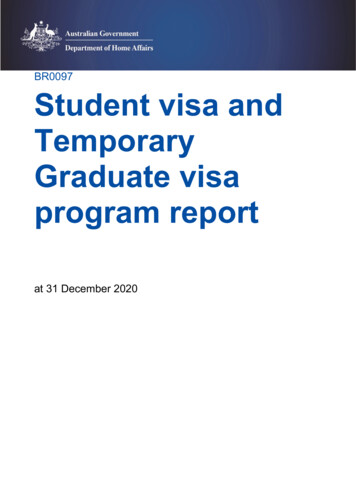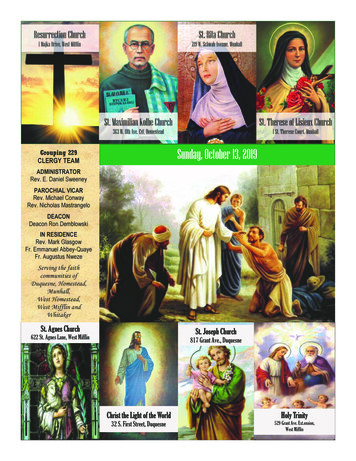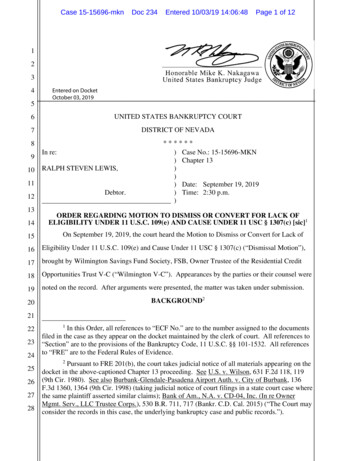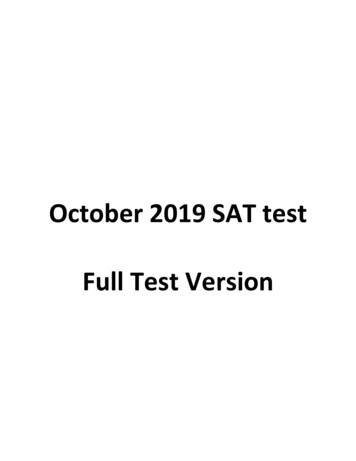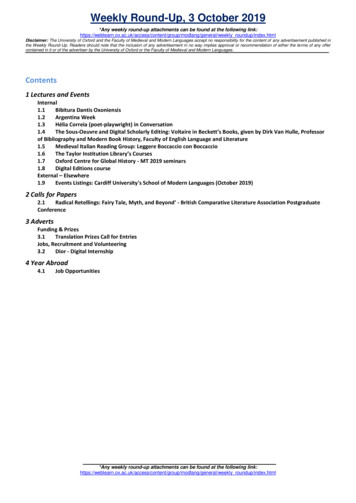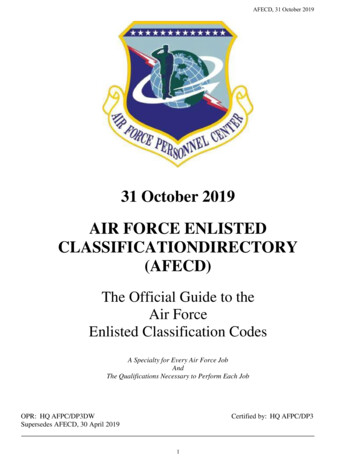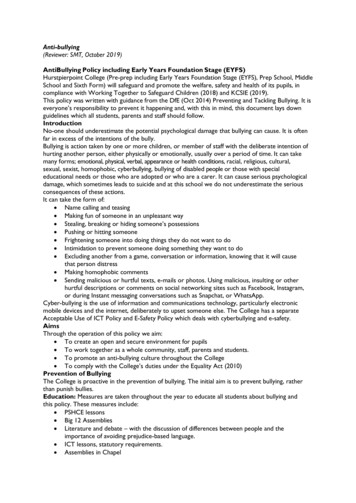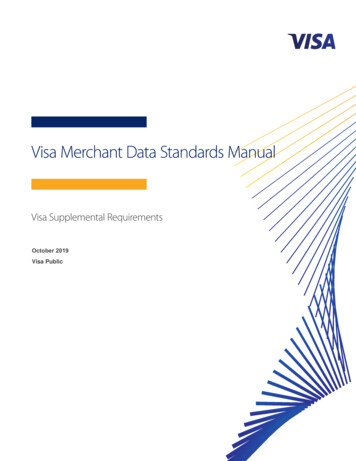
Transcription
October 2019Visa Public
This document is a supplement of the Visa Core Rules and Visa Product and Service Rules. In the event of anyconflict between any content in this document, any document referenced herein, any exhibit to this document, orany communications concerning this document, and any content in the Visa Core Rules and Visa Product andService Rules, the Visa Core Rules and Visa Product and Service Rules shall govern and control.
Merchant Data Standards ManualSummary of ChangesVisa Merchant Data Standards Manual –Summary of Changes for this EditionThis is a global document and should be used by members in all Visa Regions.In this edition, details have been added to the descriptions of the following MCCs in order to facilitate easiermerchant designation and classification: MCC 5541 Service Stations with or without Ancillary Services has been updated to include all enginefuel types, not just automotive MCC 5542 Automated Fuel Dispensers has been updated to include all engine fuel types, not justautomotive MCC 5812 Eating Places, Restaurants & 5814 Fast Food Restaurants have been updated to includegreater detail in order to facilitate easier segmentation MCC 5967 Direct Marketing – Inbound Telemarketing Merchants has been updated to include adultcontent MCC 6540 Non-Financial Institutions – Stored Value Card Purchase/Load has been updated to clarifythat it does not apply to Staged Digital Wallet Operators (SDWO) MCC 8398 Charitable Social Service Organizations has been updated to include crowd fundingmerchants that meet certain criteriaAdditionally, the following MCCs have been added or removed, please see the MCC description listed in thisdocument for full details Added:oMCC 5262 Marketplaces has been added for entities that accept Visa on behalf of sellerswith multiple lines of goods and services through an online marketplaceoMCC 9406 has been added for Government-Owned Lottery Non-US regionoMCC 5552 has been added for Electric Vehicle Charging merchantsoMCC 3838 has been added for Kimpton HotelsoMCC 3837 has been added for Hoshino ResortsoMCC 3302 has been added for Flybe AirRemoved:o October 2019MCC 3630 for Extended Stay Deluxe has been removedChanged:oMCC 3047 has changed from THY (Turkey) to Turkish AirlinesoMCC 3213 has changed from Malmo Aviation to Braathens Regional AirlinesVISA PUBLICi
Merchant Data Standards ManualTable of ContentsTable of ContentsIntroduction. 1Section 1: Merchant Data Requirements . 2Determining a Merchant Name . 3Determining a Merchant Location . 9Determining Merchant Category Codes . 16General Requirements. 16Mandatory Multiple MCCs . 17Section 2: Merchant Category Code Listing . 20Section 3: New MCC or MCC Change Requests . 102October 2019VISA PUBLICi
Merchant Data Standards ManualIntroductionIntroductionThe Visa Merchant Data Standards Manual contains requirements for merchant/paymentfacilitator/marketplace classification, location, and various data elements, including merchantlocation, merchant category codes (MCC), and other VisaNet data formats.October 2019VISA PUBLIC1
Merchant Data Standards ManualSection 1: Merchant Data RequirementsSection 1: Merchant Data RequirementsThis section contains requirements for assigning and formatting the following data elements: Merchant name Merchant location, payment facilitator location, digital wallet operator location, andmarketplace location (including city, state, and country formats) Supplementary merchant information Merchant category code (MCC)Merchant data must be the same as, or consistent with, comparable data throughout atransaction’s life cycle and on the transaction receipt.Visa retains the right to require corrections to non-compliant or confusing merchant data.October 2019VISA PUBLIC2
Merchant Data Standards ManualSection 1: Merchant Data RequirementsDetermining a Merchant NameGeneralrequirementsThe merchant name is the most important factor in cardholder recognition oftransactions. Correct use helps to minimize copy requests resulting fromunrecognizable merchant names and reduces costs to acquirers, issuers andmerchants.The merchant name must be the name most prominently displayed by the merchantand by which cardholders recognize the merchant (while also reflecting the merchant’s“Doing Business As” (DBA) name).Merchants may sometimes use names that do not cause confusion when viewed at themerchant premises, but may confuse the cardholder if viewed out of context on acardholder statement. Examples of such names would include a parking garage namedJohn’s Farm (that is no longer the site of a farm) or a restaurant named Ship Chandler.When the content of the merchant name is inconsistent with the MCC, the merchantname must contain extra information that identifies the type of merchant to thecardholder. In the example above, the merchant descriptor for John’s Farm must beJohn’s Farm Parking; the descriptor for Ship Chandler must be Ship ChandlerRestaurant.A merchant with multiple merchant outlets may add the city, store number, or otherunique identifier to distinguish the specific merchant outlet.Example One:A fuel station is a franchisee of a large retail chain. Accordingly, the retail chain name,brand, and colors are prominently displayed on the forecourt and inside the shop. Thename of the franchisee is in the window on an A4 notice for legal reasons. Themerchant name must be the name of the retail chain, possibly with an added indicationof the location.Example Two:An individual owns a taxicab that he leases to other drivers to provide taxi services aspart of a large taxi company chain. the taxicab displays the taxi company name and ispainted in the company’s colors. The driver leasing the taxi has his own acceptancecontract. For legal reasons, that driver’s name is on a plate on the dashboard. Themerchant name must be the name of the taxi company, possibly with the taxicabnumber to differentiate it from other taxis that provide services for the same company.The merchant name must not be the name of the taxi driver, nor may it be the name ofthe owner of the car.Example Three:A magazine offers annual subscriptions through postcards inserted in every issue.Although the magazine is one of several published by the same company, the publisheris not mentioned on the postcard. The merchant name must be the name of themagazine, as that is the name that was displayed to the cardholder. It may only be thename of the publishing house if the publisher was clearly shown on the postcard as themerchant.PaymentFacilitators andMarketplacesOctober 2019A merchant is an entity that sells services or goods to cardholders.If an entity is not selling goods or services to cardholders, but deposits transactions orreceives settlement on behalf of the merchant it must be classified as a paymentfacilitator.VISA PUBLIC3
Merchant Data Standards ManualSection 1: Merchant Data RequirementsIf an entity handles payments on behalf of sellers through an online marketplace thatbrings together multiple buyers and sellers it may be classified as a marketplace.In determining whether an entity is a merchant, payment facilitator, or marketplace, Visalooks at each transaction separately. There are a number of entities that operate as themerchant for some transactions and operate in a different capacity for othertransactions. Such entities must process each transaction according to the rules thatapply to the type of transaction.Franchise:ABC Inc. owns the franchise for The Ultimate Hamburger. ABC’s name is displayed ona printed sheet of paper in the office window, per government requirements. Everythingelse—including the large sign in corporate colors outside the shop, the menu boards,and the staff uniform—displays the Ultimate name. ABC’s location is indistinguishablefrom locations owned and run by Ultimate and locations owned by other franchisees.Any disputes are resolved with cardholders by Ultimate’s head office. To cardholders,Ultimate is representing itself as selling the goods. Ultimate qualifies as the merchant.Department Store:DJS is a department store and leases some areas on its ground floor to perfumecompanies that own the perfume they sell. The signage outside the shop is DJS, andthe entire store is in their corporate design and color. A customer can take goods fromany counter and pay for them at any cash register in the store. The customer sees theperfume brand being sold at a unique counter in the store, but they also see uniquecounters for different brands of jeans, which are owned and sold by DJS. Any disputesare resolved with cardholders by DJS customer service division. For the purpose of thetest, DJS is representing itself to the cardholder as selling all the goods in the store, andDJS qualifies as the merchant.Online Marketplace (1):Corriedale’s runs an online marketplace specializing in sales to sheep farmers. Thereare several hundred sellers represented on the website, some are major retailers andsome are individual sellers. Corriedale does not purchase or supply the goods.Customers using the website can search for a specific item or a specific seller. In eachcase, the names of the retailers are clearly displayed along with the price of the goods(which can vary by retailer) and ratings assigned by customers. The look and feel ofeach web page remains that of Corriedale. It is possible to combine and pay for goodsfrom multiple retailers in the same transaction. Corriedale sets the returns policy, butcustomer disputes are handled by individual retailers. Corriedale has in place aprocess for resolving disputes between cardholders and retailers. Corriedale is not amerchant—it does not represent itself to the cardholder as the seller of the goods. Visawould view the individual retailers as the merchants and Corriedale as a third party, andCorriedale must comply with Visa’s requirements associated with a third party.Corriedale would also qualify as a marketplace, if it obtains Visa‘s written approval.Note that Corriedale may choose to be a marketplace, or a payment facilitator. Both amarketplace and a payment facilitator must register through the Visa third partyregistration process.October 2019VISA PUBLIC4
Merchant Data Standards ManualSection 1: Merchant Data RequirementsOnline Marketplace (2)Specialist Parts of Munich (SPoM) is an online marketplace that brings together buyersand sellers of vintage car and truck parts in a single location. Sellers must arrange theirown payments, and often choose to use a payment facilitator with which themarketplace has a referral agreement. Sellers may choose their own acquirer or adifferent payment facilitator.SPoM does not qualify as a marketplace, as it does not handle payments on behalf ofits sellers. The payment facilitator with which it has a referral agreement is also not amarketplace, as its primary function is to facilitate payments; it does not bring togetherbuyers and sellers nor fill many of the other marketplace criteria.Formatting theMerchant NameVisa authorization and clearing systems provide 25 spaces in which to describe themerchant name and acquirers are required to be able to use all 25 spaces.Merchant names longer than 25 characters (this includes letters, blank spaces, and allsymbols) will not fit into the merchant name field and must be abbreviated (but not justtruncated after the 25th character). However, the part of the name that uniquelyidentifies the merchant to the cardholder must not be abbreviated. Information in themerchant name field must enable the cardholder to accurately identify the specificmerchant as shown in the example below:Name: NEW YORK HOME HARDWARE DISTRIBUTORS (35 characters)Possible abbreviations:N YN E WH O M EY O R KH A R D W A R EH O M EH D WD IS T R .D IS T R .Merchants must ensure that abbreviated names are recognizable.SupplementaryMerchant NameInformation forSpecificTransactionsIn general, the merchant name field must only contain the merchant name, as set outabove. However, there are a number of specific exceptions to this rule in the tablebelow.Note: even for the categories set out below, supplementary data is not permitted if itmakes the content of the merchant name field confusing or counter to otherrequirements (such as abbreviation requirements). In some cases, the merchant namemay not be truncated at all.The supplemental data must be static, and must appear in all transactions. Forexample, if a merchant outlet chooses to include a location descriptor in the merchantname field, it must be the same in every transaction. Two exceptions to this rule areairline/US railway ticket numbers and the words “No Show”, which need only appear inno show transactions.If a merchant with multiple merchant outlets chooses to include a location descriptor inthe merchant name field. It must use the same type of information (for example, cityname) for all its outlets. It must not add the city name for some outlets, the store numberfor some outlets and no information for others.October 2019VISA PUBLIC5
Merchant Data Standards ManualSection 1: Merchant Data ary DataPurchase ofgoods orservicespurchased atan airline orUS passengerrailwaymerchant(“ancillarypurchase”)A general description of the type of purchase (beverage, meals, seat upgrade,lounge access, duty free, etc.)Purchase ofan airlineTicket (orpassengerrailway ticketsin the USRegion)Must contain all of the following:Purchase atan AFDInformation in the merchant name field must use the following format: Merchant name in the first 11 or 12 positionsOptional A blank in position 12, if applicable A general description of the goods or services beginning position 13For example:A IR L IN E N A M ED U T Y -F R E E An abbreviated airline (or US railway) name in the first 11 or 12 positions A blank in position 12 if applicableRequired Airline (or US railway) ticket identifier beginning position 13For example:A IR L IN E N A M E1 2 3 4 5 6 7 8 9 0 1 2 3Most fuel is sold under large retail brands, and that brand must be the merchantname. Since the brand often has multiple locations in a city, the merchant is likelyto include a place descriptor such as a city name or a location number. Therequired merchant name must not be abbreviated or truncated in order to placesupplemental information into the merchant name field.RequiredFor example:B IGB R A N DP E T R O L# 3 2 2Purchase at aUCAT inRussia(CEMEARegion)If the transaction takes place at an unattended terminal in Russia operated by athird party, the third party's name (or an abbreviation of the third party's name)must be included with the associated merchant name.RequiredPurchase ofGoods orServicesAdditional information may be included after the merchant name and an asterisk (*)to indicate an order number, reference number, or other information to identify thetransaction.OptionalIf the transaction is an installment transaction, installment information (1 of 2, 2 of2, etc.) must appear after the asterisk.For vehicle rental and hotel merchants, the merchant name must not be truncatedin order to place supplemental information into the merchant name field.CashFor a manual cash disbursement at a member location, the disbursing member’sname must appear first, followed by the disbursing location’s branch, officenumber, or other unique identifier.G R E A TB A N KW E S TRequiredE N DFor an automated cash disbursement at a member location, a transactiondescriptor such as “cash” must be used, and at least one of the following: October 2019Disbursing member nameVISA PUBLIC6
Merchant Data Standards ManualTransactionRequired/OptionalSupplementary Data Name of the disbursing member’s affiliated domestic, regional, or nationalnetwork The 3-digit servicing carrier code and a 10-digit transmission control network,excluding the check digit A 3-digit carrier number, 3-digit form number, and 7-digit serial number,excluding the check digitB A N C O L O M B IOriginal CreditTransactionsSection 1: Merchant Data RequirementsAC A S HB A N C O LC A S H1 2 3 1 2 3 4 5 6 7 8 9 0As required by the Visa Direct Original Credit Transaction (OCT) GlobalImplementation GuideRequiredNo-ShowTransactionsMay also include the words “NO SHOW” after the merchant name.OptionalPaymentFacilitatorEffective through 18 October 2019, if the merchant uses a payment facilitator(and is therefore a sponsored merchant), the payment facilitator name (or anabbreviation) must appear with the sponsored merchant name.RequiredThe merchant name field must contain the name of the payment facilitator (oran abbreviation) followed by an asterisk (*) and then the sponsored merchantname (e.g., Payment Facilitator name*Sponsored Merchant name). AnAcquirer must ensure that the Payment Facilitator or Sponsored Merchantname remains consistent for all Transactions.Effective 19 October 2019, the merchant name field in a payment facilitatortransaction may be populated with either the sponsored merchant name(alone), or a combination of both the sponsored merchant and paymentfacilitator name, using (i) the name of the payment facilitator (or anabbreviation), (ii) followed by an asterisk (*), and (iii) the sponsored merchantname (e.g., Payment facilitator name*Sponsored Merchant name). Themerchant name field should include the name that is most recognizable to thecardholder, which Visa recommends to be the sponsored merchant name(alone).Staged DigitalWalletFor funding transactions, the merchant name field must contain the name ofthe digital wallet operator.RequiredFor purchase transactions, the merchant name field must contain (i) the nameof the digital wallet operator, (ii) followed by an asterisk (*), and (iii) the retailername.MarketplaceEffective through 12 April 2019, the marketplace may use the marketplacename alone. It may choose to insert the name of the seller into the merchantname field, using (i) the name of the marketplace (or an abbreviation), (ii)followed by an asterisk (*), and (iii) the retailer name.RequiredEffective 13 April 2019, the marketplace must use the marketplace name alone.BusinessPaymentSolutionProvider(BPSP)October 2019The BPSP name must appear with the supplier name. The BPSP name must bethe merchant name it registered with Visa. The complete name should appear. Anabbreviation may be used for long names, but it must be easily recognizable.RequiredThe field must contain (i) the name of the BPSP (ii) followed by an asterisk (*) and(iii) the supplier name, or an abbreviation, (e.g. BPSP name*supplier name). AnVISA PUBLIC7
Merchant Data Standards ManualTransactionConsumer BillPaymentServicer(CBPS)Section 1: Merchant Data RequirementsRequired/OptionalSupplementary Dataacquirer must ensure that the BPSP or supplier name remains consistent for alltransactions.Effective 17 October 2020, the CBPS name must appear with the biller name.The CBPS name must be the merchant name it registered with Visa. The completename should appear. An abbreviation may be used for long names, but it must beeasily recogniza
Service Rules, the Visa Core Rules and Visa Product and Service Rules shall govern and control. Merchant Data Standards Manual Summary of Changes October 2019 VISA PUBLIC i. Visa Merchant Data
